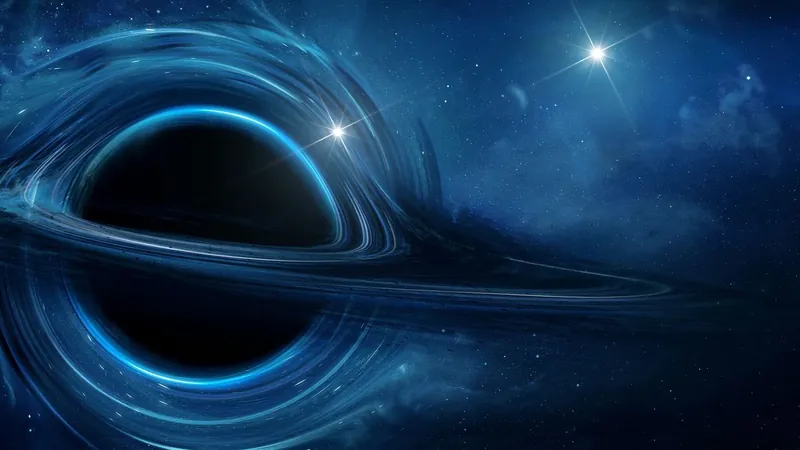
Do Black Holes Really Evaporate? The Shocking Truth Unveiled!
2024-12-22
Author: Mei
Introduction
In 1974, renowned physicist Stephen Hawking ignited the scientific community with a groundbreaking concept: despite the prevailing belief that nothing can escape a black hole's event horizon, he suggested these cosmic giants could actually emit particles. This captivating idea sparked a relentless debate that has lasted over half a century, putting two fundamental pillars of physics – general relativity and quantum mechanics – in direct conflict.
The Nature of Black Holes
So, how do black holes evaporate, and what happens to them? While physicists continue to grapple with this perplexing question, several theories have arisen in recent decades to explain how black holes seem to defy the laws of the universe by disappearing over time.
MIT physicist Daniel Harlow shared, "We've spent the last 50 years fighting about it. Now, we have a much better understanding than Hawking had in his time."
Black holes were first predicted by Albert Einstein in 1915 through his theory of general relativity, which describes gravity as a consequence of curved space-time. These cosmic entities exist in such a dense and massive state that their gravitational pull is so strong that not even light can escape.
Astrophysicist Heino Falcke, who played a role in capturing the first image of a black hole in 2019, elaborated, "According to general relativity, everything can only go inside [a black hole], and nothing can ever come out. Everything that enters is crushed to a singular point."
Hawking Radiation and Black Hole Evaporation
However, Hawking's revelations 60 years later brought a shocking twist to this narrative. In the realm of quantum mechanics, pairs of particles – particles and their antiparticles – flicker in and out of existence. Hawking postulated that under certain conditions at the event horizon, one of these particles can be sucked into the black hole while its counterpart escapes, forming a phenomenon known as Hawking radiation. This process allows black holes to slowly lose mass and energy over time, leading to their eventual disappearance.
But don’t grab your popcorn just yet—this evaporation process is incredibly slow. A black hole the size of our Sun could take an unfathomable 10^67 years to evaporate, far exceeding the age of the universe as we know it. So far, scientists have not detected evidence of this Hawking radiation, leading to ongoing efforts to observe it in laboratory conditions or through smaller black holes that might evaporate faster than their larger counterparts.
The Black Hole Information Paradox
However, Hawking's theory raises more questions than it answers, particularly regarding the infamous black hole information paradox. If a black hole evaporates, what happens to the information about the matter that fell in? This contradicts a crucial principle in physics: the idea that the state of a system at one moment can predict its future states.
Resolving this paradox is a daunting task for physicists. "Any resolution of Hawking's paradox forces you to abandon some core principle of physics," Harlow explained. Interestingly, Hawking himself considered sacrificing predictability in his quest for answers back in 1976.
Some physicists are diving into the world of thermodynamics and entropy to tackle this dilemma, while others are exploring concepts of locality versus nonlocality. The latter proposes that particles inside a black hole might share quantum properties with those outside its grasp, hinting at a far deeper connection across seemingly disconnected realms.
Recent Developments
A recent study published in *Physical Review Letters* in 2023 suggests the information paradox may extend beyond black holes altogether. Researchers, including Falcke, suggest that all objects might share this evaporation issue, deepening the enigmatic nature of the universe.
In Falcke's words, "There's something in the world we cannot explain. But perhaps, by creating more mysteries, we inch closer to a profound solution."
Conclusion
The quest to unravel the secrets of black holes and their potential for evaporation continues, captivating both scientists and curious minds alike. Could it be that the answers lie in realms we have yet to explore? Stay tuned as this story unfolds!






 Brasil (PT)
Brasil (PT)
 Canada (EN)
Canada (EN)
 Chile (ES)
Chile (ES)
 España (ES)
España (ES)
 France (FR)
France (FR)
 Hong Kong (EN)
Hong Kong (EN)
 Italia (IT)
Italia (IT)
 日本 (JA)
日本 (JA)
 Magyarország (HU)
Magyarország (HU)
 Norge (NO)
Norge (NO)
 Polska (PL)
Polska (PL)
 Schweiz (DE)
Schweiz (DE)
 Singapore (EN)
Singapore (EN)
 Sverige (SV)
Sverige (SV)
 Suomi (FI)
Suomi (FI)
 Türkiye (TR)
Türkiye (TR)